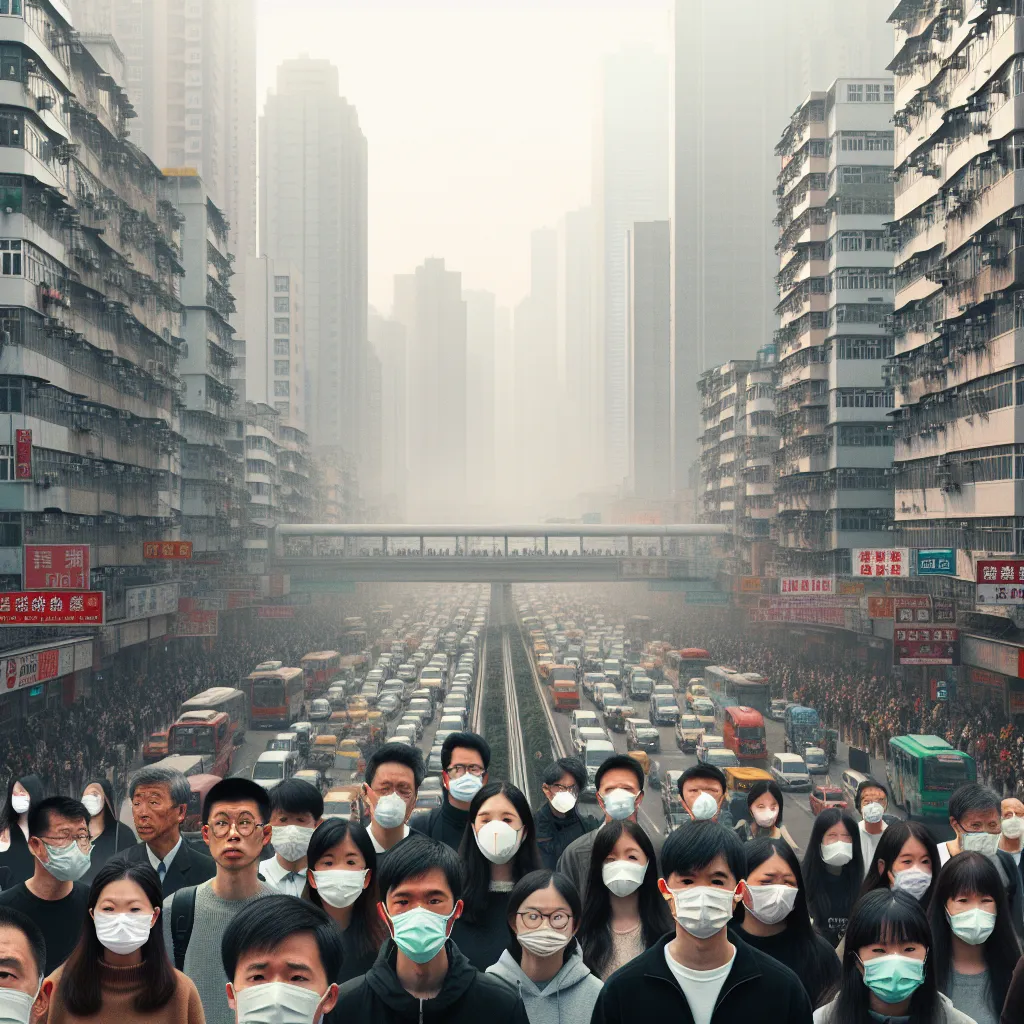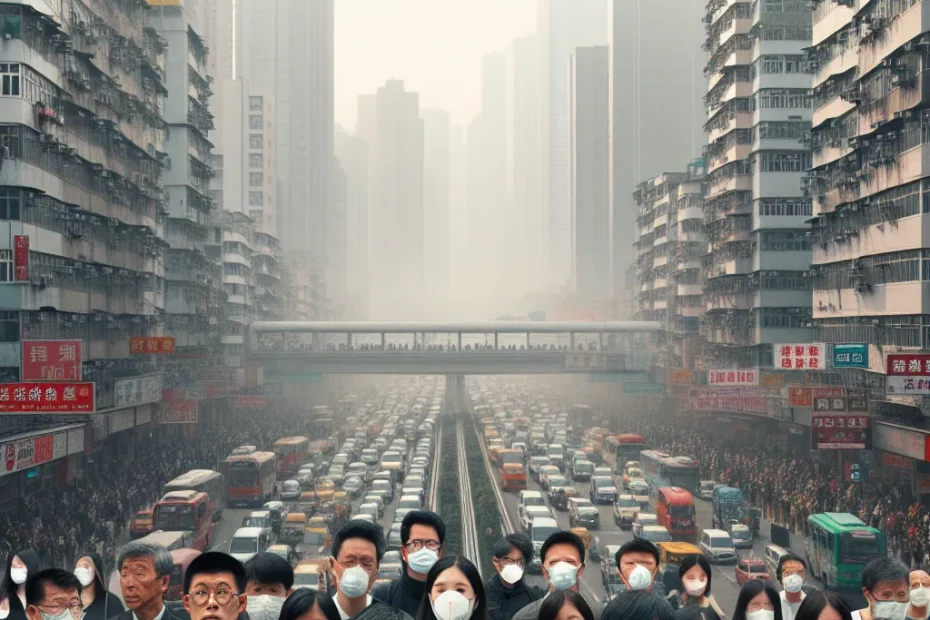As we navigate through the bustling urban areas of Korea, one thing that often goes unnoticed is the quality of the air we breathe. The issue of air pollution is a growing concern, impacting not only our environment but also our health. Understanding the sources of air pollution in urban areas is crucial in addressing this issue. Poor air quality can have detrimental effects on public health, leading to respiratory problems and other serious conditions. However, the government has been taking initiatives to combat air pollution and improve the overall air quality in urban areas. But the responsibility doesn’t solely lie on the government – individuals can also play a significant role in reducing their carbon footprint and improving air quality. Let’s explore some simple yet effective tips to make a positive impact on the air we breathe.

Understanding Air Pollution Sources in Urban Areas
Hey there, folks! Today, let’s dive into the nitty-gritty of air pollution sources in urban areas, especially in the bustling cities of Korea. Air pollution is a serious issue that affects not only our health but also the environment around us. So, let’s roll up our sleeves and get to the bottom of where all this pollution is coming from!
Vehicular Emissions
First off, one of the major sources of air pollution in urban areas is vehicular emissions. With the increasing number of cars and buses on the roads, the exhaust fumes containing harmful substances like nitrogen oxides and particulate matter are released into the air. These pollutants can have detrimental effects on our respiratory system and overall well-being. 🚗💨
Industrial Activities
Industrial activities also play a significant role in contributing to air pollution in urban areas. Factories and manufacturing plants release pollutants such as sulfur dioxide, carbon monoxide, and volatile organic compounds into the atmosphere. These emissions can lead to smog formation and acid rain, impacting both human health and the ecosystem. 🏭☁️
Burning of Fossil Fuels
Let’s not forget about the burning of fossil fuels for energy production. Power plants that rely on coal, oil, and natural gas emit large amounts of greenhouse gases, including carbon dioxide and methane, into the air. These gases trap heat in the atmosphere, contributing to global warming and climate change. 🌍🔥
Biomass Burning
Another important source of air pollution in urban areas is the burning of biomass for cooking and heating purposes. In many households, especially in developing countries, wood, crop residues, and dung are burned for fuel, releasing harmful pollutants like carbon monoxide and particulate matter. Indoor air pollution from these sources can have severe health impacts, particularly for women and children. 👩👧🔥
Construction Activities
Furthermore, construction activities in urban areas can generate dust and particulate matter, adding to the overall air pollution levels. The excavation, demolition, and transportation of materials can release fine particles into the air, affecting air quality in the vicinity of the construction sites. 🚧⚠️
In conclusion, air pollution in urban areas is a complex issue with multiple sources contributing to the problem. By understanding where these pollutants come from, we can take steps to mitigate their impact on our health and the environment. So, let’s raise awareness, adopt cleaner technologies, and work together to combat air pollution for a cleaner and healthier future! 🌿💪
Remember, every little effort counts in the fight against air pollution. Stay informed, stay proactive, and let’s make our urban areas a breath of fresh air! ✨🌬️
Effects of Poor Air Quality on Public Health
Hey there, folks! Today, let’s dive into a serious topic that affects each and every one of us – the effects of poor air quality on public health. 🌬️🏙️
Impact on Health
Did you know that breathing in polluted air can have a direct impact on our health? It’s not just about feeling a bit under the weather; poor air quality can lead to serious health issues. According to the World Health Organization (WHO), air pollution is linked to a wide range of health problems, including respiratory diseases, heart disease, stroke, and even cancer. 😷💔
Effects in Urban Areas
In urban areas, where the concentration of pollutants is often higher due to traffic, industrial activities, and other factors, the effects on public health can be particularly severe. Studies have shown that people living in cities with high levels of air pollution are more likely to develop asthma, bronchitis, and other respiratory conditions. Children and the elderly are especially vulnerable to the harmful effects of polluted air. 👶👴
Impact on Cardiovascular Health
Not only does poor air quality affect our respiratory system, but it can also have negative impacts on our cardiovascular health. Long-term exposure to air pollution has been linked to an increased risk of heart attacks, strokes, and other cardiovascular diseases. The tiny particles in polluted air can enter our bloodstream and cause inflammation, leading to a higher risk of heart problems. ❤️💔
Mental Well-being
But it’s not just our physical health that is at risk. Poor air quality can also take a toll on our mental well-being. Studies have shown that living in areas with high levels of air pollution is associated with an increased risk of anxiety, depression, and other mental health issues. The constant exposure to pollutants in the air can affect our mood and cognitive function, impacting our overall quality of life. 😔💭
Protecting Ourselves
So, what can we do to protect ourselves from the harmful effects of poor air quality? It’s essential to stay informed about the air quality in our area and take precautions when pollution levels are high. Using air purifiers at home, avoiding outdoor activities during peak pollution hours, and supporting policies that aim to reduce air pollution are just a few steps we can take to safeguard our health. Let’s work together to create a cleaner and healthier environment for everyone! 🌿🌍
Remember, the air we breathe matters, so let’s take care of our planet and ourselves. Stay safe and breathe easy, friends! 💚✨
Government Initiatives to Combat Air Pollution
Hey there, folks! Today, let’s dive into the topic of government initiatives to combat air pollution in urban areas of Korea. It’s no secret that air quality is a major concern in many bustling cities, and the Korean government has been taking some serious steps to tackle this issue head-on. 🌬️🏙️
Implementation of Strict Emission Standards
One of the key initiatives introduced by the government is the implementation of strict emission standards for vehicles. By ensuring that cars on the road meet certain environmental criteria, they are working towards reducing the amount of harmful pollutants released into the air. This not only improves the air quality for all of us but also contributes to a healthier environment for future generations. 🍃🌍
Investment in Public Transportation Infrastructure
Moreover, the government has been investing heavily in public transportation infrastructure. By promoting the use of buses, subways, and trains, they aim to reduce the number of cars on the road, ultimately decreasing air pollution levels. This not only provides a more sustainable way for people to commute but also helps in curbing harmful emissions. 🚉🌿
Promotion of Renewable Energy Sources
In addition to these efforts, the Korean government has been actively promoting the use of renewable energy sources. By shifting towards cleaner energy options such as solar and wind power, they are working towards reducing the reliance on fossil fuels, which are a major contributor to air pollution. This transition to renewable energy not only helps in combating air pollution but also in building a more sustainable energy future. ☀️💨
Regular Air Quality Monitoring
Furthermore, the government has been conducting regular air quality monitoring and implementing early warning systems to alert the public about potential pollution spikes. By keeping a close eye on air quality levels, they can take prompt action to mitigate any adverse effects on public health. This proactive approach demonstrates the government’s commitment to ensuring the well-being of its citizens. 📊🚨
Overall, these government initiatives play a crucial role in combating air pollution and improving the quality of air in urban areas of Korea. By implementing strict emission standards, investing in public transportation, promoting renewable energy, and monitoring air quality, the government is taking significant steps towards creating a cleaner and healthier environment for all of us to enjoy. 🌿🌟
So, let’s continue to support these initiatives and work together towards a greener and cleaner future for our beautiful cities! Remember, every little effort counts in the fight against air pollution. Let’s make a difference, one step at a time! 🌈💪
Tips for Individuals to Reduce Carbon Footprint and Improve Air Quality
Hey there, eco-warriors! 🌿 Are you ready to make a difference in the world and tackle air pollution in urban areas like a pro? Let’s dive into some practical tips that can help you reduce your carbon footprint and improve air quality around you.
Transportation
First off, let’s talk about transportation. Did you know that transportation accounts for a significant portion of carbon emissions? 🚗 Opt for public transportation, carpooling, biking, or walking whenever possible. Not only will you be reducing your carbon footprint, but you’ll also be getting some exercise and saving money on gas – it’s a win-win situation!
Energy Consumption
Next up, let’s chat about energy consumption. 💡 Consider switching to energy-efficient appliances and LED light bulbs to reduce your electricity usage. Unplug devices when they’re not in use and turn off lights when you leave a room. Small changes like these can add up to significant energy savings over time.
Single-Use Plastics
Now, let’s address the elephant in the room – single-use plastics. 🥤 Say no to plastic straws, bags, and utensils, and opt for reusable alternatives instead. Invest in a good quality water bottle and coffee cup to reduce your plastic waste. Remember, every little bit counts when it comes to protecting our environment.
Supporting Local and Sustainable Businesses
Another great way to reduce your carbon footprint is by supporting local and sustainable businesses. 🌱 Choose products that are ethically sourced and produced, and try to shop locally to reduce the carbon emissions associated with transportation and shipping. By supporting eco-friendly businesses, you’re not only helping the environment but also encouraging others to follow suit.
Educate and Spread the Word
Last but not least, spread the word and educate others about the importance of reducing carbon emissions and improving air quality. 🌍 Share these tips with your friends and family, and lead by example in your community. Together, we can make a real difference and create a cleaner, healthier environment for future generations.
So there you have it, folks – some simple yet effective tips to reduce your carbon footprint and improve air quality. Let’s join forces and work towards a greener, cleaner planet for all! Remember, every little action counts. Let’s do this! 🌎✨
As we navigate the challenges of air pollution in urban areas of Korea, it is crucial for each one of us to play our part in improving air quality. By understanding the sources of air pollution, recognizing its effects on public health, and supporting government initiatives, we can make a difference. Simple actions like reducing our carbon footprint, using public transportation, and promoting green practices can go a long way in creating a cleaner and healthier environment for all. Let’s work together towards a future where clean air is a reality for everyone.
